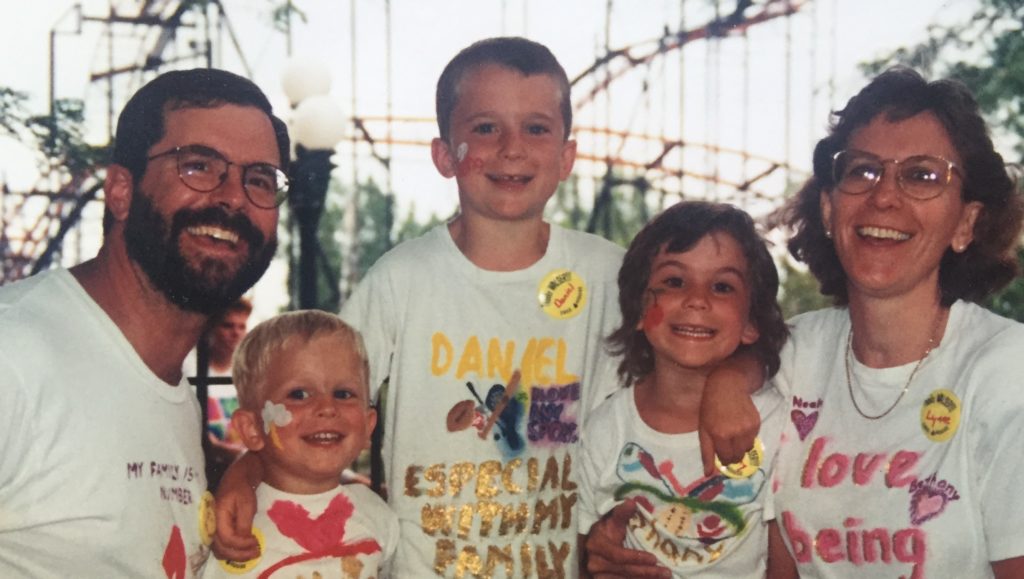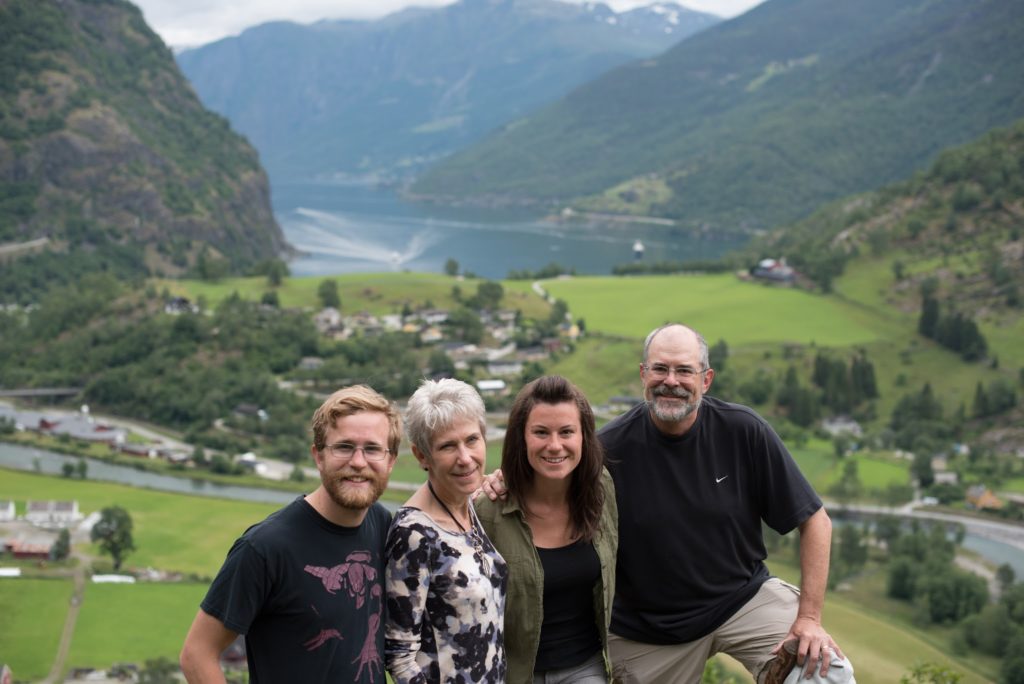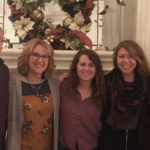
From Pandemonium to Purpose: Finding Your Family’s Superpowers
An article from the Founders' Archives

Being in a family can seem like a crazy collision of everyone’s challenges and weaknesses. One parent tends toward impatience and strong demands. Another might tend to nag and/or caretake, while the kids offer any combination of arguing, whining, hiding, or lying in order to cope with the chaos. How can you get from pandemonium to purpose?
It can be a natural default to just want to “fix it” when all those challenges come together in a “perfect storm”. Unfortunately, the way this is often done just leads to discouragement and more of the same later. On the most challenging days it can feel like hopeless mayhem, and it becomes easy in that state to form negative habits that get worse. Not better.
But there is a way out! Three game-changing principles and some practical ideas can help you build new habits and wisdom for transforming the chaos in your family.
Three Principles to “Calm the Crazy!”
1) Each person’s struggle has a strength.
When a family member struggles with something that adds to the daily chaos and stress, there is almost certainly a bright side to that struggle that reveals a God-given gift. We call this the “Gift-Gone-Awry.” In our family it looked like this:
- Jim’s quick temper and strong words during chaos revealed an underlying gift of passion and expressiveness.
- Lynne’s tendency to nag could also show up as good attention to detail and follow-through.
- Daniel’s strong arguing was a reflection of his gift of leadership and passion for justice.
- Bethany’s easily hurt feelings grew out of her relational sensitivity and compassion.
- Noah’s ability to fly under the radar and evade family conflict was reflective of his logical, analytical nature.

Valuing everyone’s gifts helped us to be more patient when those gifts went off track. When Daniel whacked Bethany one day for accidentally stepping on Noah’s Lego creation, she said to us through her tears, “Daniel was just trying to protect his little brother.” She used her gift of relational sensitivity to identify Daniel’s gift of taking charge of “justice.” This did not negate his responsibility to make it right with her, but her insight allowed for easier reconciliation.
When family members respond to challenges this way, it communicates messages of, “Even though you are having a hard time right now, I still see the good in you. You are so valuable and ‘wonderfully-made’.” What an important message for both ourselves and our kids!
2) Strengths are given by God to build up your family.
There was a second layer to this view of our strengths. Once we identified gifts, we helped each other learn to use them to contribute. This flowed from our belief that each one of us was “called and capable” to do the good works which God had prepared for us to do in our families.
(To learn how to see the strength in struggles, read the article 12 Misbehaviors and the God Given Gifts Behind Them.)
Together, we began to discover and value our strengths:
- Jim’s passionate expressiveness helped him lead lots of fun, connective interactions.
- Lynne’s attention to detail/follow-through kept the family machine running reasonably smoothly and helped kids learn responsibility.
- Daniel often used his leadership to engage siblings in creative endeavors together, growing lasting bonds between them.
- Bethany was compassionate and sensitive to everyone’s emotions.
- Noah was the easy-going peacemaker in our intense family.
(Helpful article: How to Parent Together When You Are Total Opposites)
Fast forward to 2016. We took a trip with two of our kids and went through an amazingly beautiful country in an unforgettable experience. But one of the most unforgettable things was how we traveled. On the first day we naturally slipped into roles rooted in our strengths, making for a smooth, joy-filled trip.

Jim was our trip tour guide – planning fun, meaningful activities. I did food and supplies management. Noah was the adept navigator who got us everywhere we needed to go. Bethany was our photojournalist, skillfully capturing the beauty and emotions.
As I drifted to sleep at night, I often marveled at the beautiful way God designed families. We are each created to know – “I belong, and I have a unique contribution to make!” At Connected Families we believe that many troubles in families can be healed when parents communicate to their kids, “You belong! And you have a unique contribution to make.”
3) Kids thrive when they identify strengths and unique roles.
Research tells us that “…people who focus on their strengths are more than three times as likely to report having an excellent quality of life.”* We believe that families that focus on each others’ strengths will likewise have excellent quality of life together.
But more importantly, using our gifts to serve God and bless others also helps us understand God in a deeper way – experiencing His wonderful creativity and compassionate love for each person.
“You are… my servant whom I have chosen, so that you may know and believe me and understand that I am he.”
Isaiah 43:10a
Many families in the Connected Families community have experienced the encouraging dynamic that, “We all belong and have a unique contribution to make.” Often the growth in this area comes from their struggles.
Nina guided her intense, sometimes impulsive, little guy to contribute to the family with his gifts:
Connor is an “act first – think later” kid, with big emotions. I resonate with the gift-gone-awry perspective and so I’ve spoken encouragement into him, “Hey buddy, your quick reactions are a gift. This means that you have “brave” in you already, and that means that God’s going to call you to do something that other people might think twice and not do. But there are other times, like when we’re crossing the street, that it is important to think twice, so we’ll work on that. And I love that you have big emotions and can get really determined. Sometimes you take over our family events and you make them happen.”
Even though 6-year-old Connor is our youngest, he is our family event planner. A couple weeks ago, I said, “Can you help me plan a family night tonight?” And sure enough – he did. Afterward I said, “Buddy, thank you for helping me, because by the end of the day I was already getting distracted. Your determination made it happen!”
What might it look like for every person in your family to know and utilize their strength beneath a struggle to be a blessing? Take some time to be thoughtful about this, and make this part of your family discussions and culture.
Three discussion questions to get you started:
1.) What is a struggle for each of us?
Each family member can choose to identify their own, but let kids know – it’s not anyone’s job to identify someone else’s weaknesses! Lead with authenticity as you share your struggle area.
2.) What is a corresponding strength?
Encourage insights about each person, whether or not they identified a struggle.
- In what ways do we show caring for one another?
- When have we worked hard to contribute?
- How do we bring joy and laughter?
3.) How could we each use our gifts even more to contribute to the family?
When kids feel empowered to use their strengths in practical ways it equips them to use their strengths for good! Try coming up with a list of the ways your family could serve each other and others in your community. You can find some great ideas in our article, “84 Ways to Serve as a Family”.
For younger kids you can describe challenges and corresponding strengths as “Superpowers” that can be used in hurtful or helpful ways. Heather McFadyen of Don’t Mom Alone used this term in a podcast with her husband called Roles, Goals, and Super-powers.
Don’t miss the unique way God’s grace shows up as a gift in each person in your family!
Each of you should use whatever gift you have received to serve others, as faithful stewards of God’s grace in its various forms.
1 Peter 4:10
Learn this verse together. Help your kids identify the God-given gifts in their struggles and then learn to use those gifts to be a blessing and contribute to your family. You will prepare your children to understand God more deeply, find their place in the body of Christ and walk in their God-given calling!
What are your parenting strengths?
You’ve got them. Knowing your strengths will help you become the best parent you can be. Knowing your parenting challenges is useful information too. Take our FREE ASSESSMENT.






